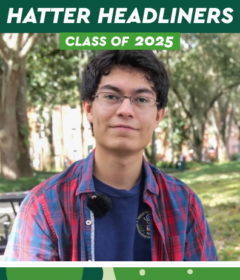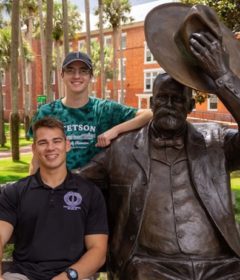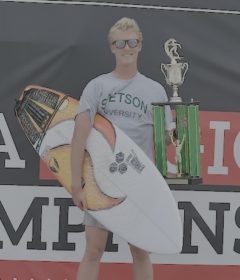Ukrainian Students, Associate History Professor Return to War-torn Country as They Straddle Two Worlds
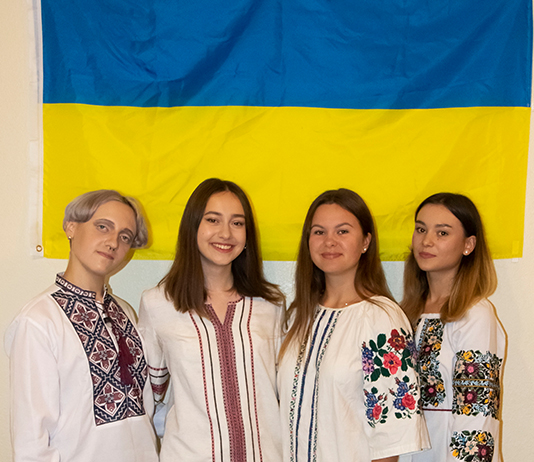

The trip from Florida to Ukraine is a test of human resilience and determination: beginning with a flight to Miami, followed by a flight to Poland, and concluding with a seemingly interminable bus trip into Ukraine. But wild horses—or, in this case, drone and missile attacks, marked by the screams of air raid sirens—couldn’t keep three Ukrainian students and Stetson University’s Associate Professor of History away this summer.
“Honestly, it is exhausting, especially when you have long layovers,” admits Ternopil native Yuliia Balan, a senior focusing on international relations.
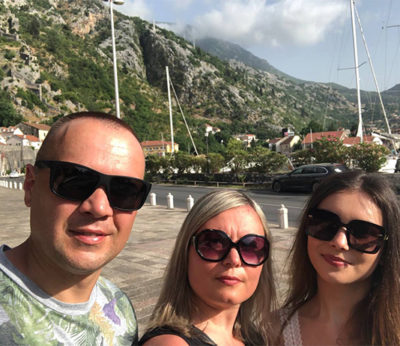
“Ukraine is where my heart is, so I was extremely willing to go back,” says Yana Verbova, a senior in health sciences who spent the summer with her family in Chernivtsi. Her determination reflects the nature of her people. “They will never give up,” she says.
For Mayhill Fowler, PhD, associate professor of History, who lectures each summer at the Center of Urban History in Lviv, returning to Ukraine was a necessary show of solidarity to her longtime friends there.
“I felt like I couldn’t consider myself a Ukrainianist, a scholar of Ukraine, if I didn’t actually come back,” she says. “My friends and colleagues really wanted me to come back and it was really important for me to do so. To show support for people and show how much I care and be able to take this experience back to the United States, back to my students, back to Stetson, to keep up support for Ukraine among our American population.”
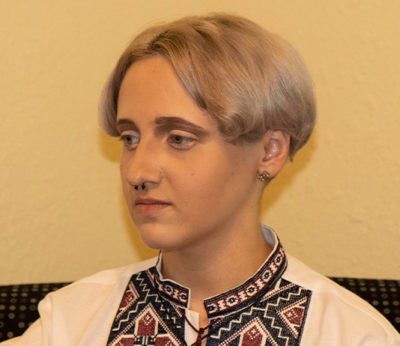
Sophomore and political science student Genevia Gayden returned with hopes of helping the war effort. Though they were able to visit family in Kyiv and friends, Gayden found their efforts within the country were limited by the unavailability of jobs. “It turns out in this case, ironically so, I will be more productive in the U.S. I hope that changes at some point.”
An Unchanging Hope in a Changing Landscape
No Ukrainian city, big or small, is impervious to attacks, as Balan learned in May. As the Ukrainian band Tvorchi took the stage at the Eurovision Song Contest in England, Russian missiles hit the band’s—and Balan’s— hometown.
“The war has affected everyone, but what remains unchanged is Ukrainians’ hope for Ukraine’s victory,” she says.
Balan returned to Ukraine to take in-person exams at the Ivan Franko National University of Lviv, through which she’s taking classes online while attending in-person classes at Stetson. But the trip also gave her the opportunity to be visit her family and friends, who “all now work for the sake of our country.”
Her mother helped set up a refugee camp at a school while her brother provides video documentation of the aftermath of attacks. Gayden has been working for Ukraine Ministry of Youth and Sport, donating 40 percent of their paycheck to the war effort.
Gayden sees the weight of the war reflected in the weariness of many around them. “They try to find some type of escape”—often through alcohol or drugs—”but there’s no type of escape.”
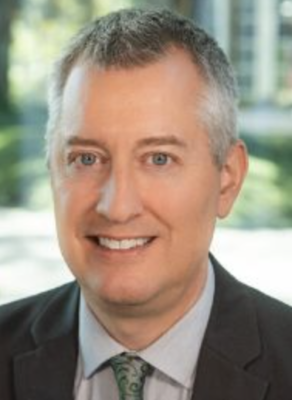
Gayden, Balan and Verbova are three of four Ukrainian students who arrived at Stetson in fall 2022 as part of the university’s Ukraine Initiative, whose funding was renewed for the 2023-2024 school year, co-chaired by Martin Blackwell, PhD and Elizabeth Plantan, PhD. The three share an apartment with senior economics student and marketing assistant for WORLD, Veronika Shchur, who was unable to return home while awaiting approval of her travel authorization.
Shchur worked in DeLand as a marketing assistant and as a lifeguard over the summer and expects to return home next summer—possibly even as soon as winter break. She remains in contact with her family, though the news from home is discouraging.
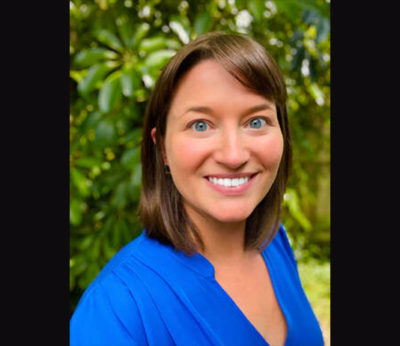
“Life goes on, but still the world will remember this. It’s not getting better. We still need to help Ukraine,” she says.
Fowler, Gayden, Balan and Verbova struggled to acclimate to the sounds of air sirens, the devastated landscape, and the reality of so many lost and shattered lives.
“During my first nights after my return to Ukraine, I woke up every single night, tried to find shelter in our own flat, and was extremely worried about the things that could have happened,” Verbova confesses. Her tension eased with time, though “you can never be fully relaxed during the war time.”
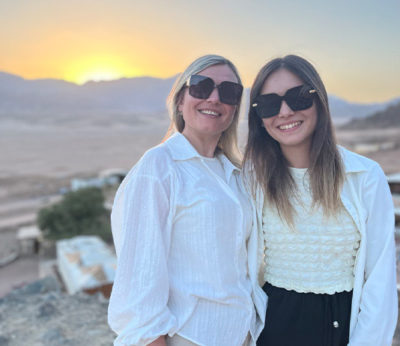
Fowler, who has been staying with a friend and colleague from the center where she teaches, remembers her own indoctrination to the terror Ukrainians face. “I heard the Iranian Shahed drones that came to Lviv and hit a chunk of a building about three blocks away,” she recalls. “I was terrified and I could not believe people in Kharkiv, even Kyiv, hear this every day.”
But the Ukrainian people, armed with resilience, continue to fight and live their lives. “I’ve been to lectures here in the evening, and the rooms are full, and the theater’s full, and there are new cafes and new restaurants, and people are persistent in living their lives despite the war—because of the war,” Fowler says.
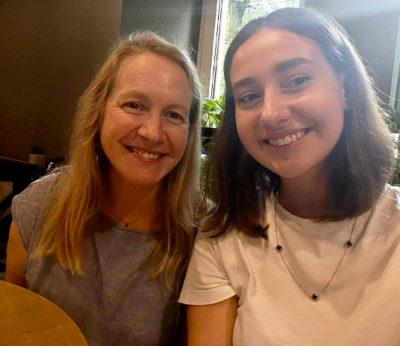
A two-hour “catch-up session,” as Balan describes it, with Fowler in Lviv became a source of mutual encouragement. “We discussed everything that happened during the time we hadn’t seen each other,” Balan says. “I got inspired after our conversation because Dr. Fowler is a fantastic person!”
“It felt much more right to be speaking Ukrainian with her in a coffee shop in Lviv than in my office at Stetson,” Fowler says. “But she’s so excited to come back. She’s ready to come back to her friends on campus.”
An Eye Toward The Future
As the students prepared for the arduous journey back to Florida, they couldn’t help but think about their futures in light of the future of their beloved homeland. After graduating in May 2024, Shchur plans to work before pursuing her master’s degree in hopes of using her knowledge of economics to help rebuild her country.
“I would like to become a part of the Ukrainian government and be part of economic development,” Shchur says. “Even before the war, Ukraine needed some economic improvements, and now especially.”
She may find herself serving someday alongside Gayden, who hopes to follow in their politician father’s footsteps. For the time being, Gayden will assess where their efforts will be put to best use. “I will stay in whatever space I can be in, where I can contribute the most to the war effort. If it remains the U.S., I’m for it. If it’s not, great. I’ll go back.” But Gayden’s heart is to be back home.
Balan also has political aspirations, which she hopes to pursue after receiving a master’s degree either in the United States or Europe after graduating in May. “Any region I choose doesn’t change my desire to work for Ukraine in rebuilding it and strengthening the political system afterward,” she emphasizes.
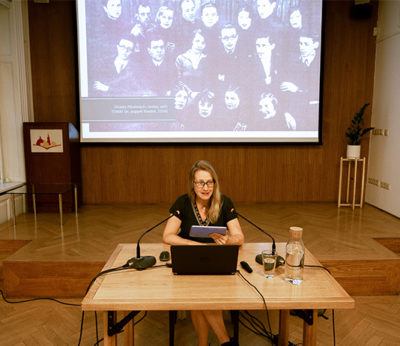
Fowler’s empathy for Ukraine has strengthened her resolve to continue studying and working alongside the people she loves. “Certainly I feel more motivated to keep researching, teaching and talking about Ukraine. I feel more motivated to finish my book on women in Ukrainian theater,” she says.
As for Verbova, the war has taught her the unpredictable nature of life and the need to be flexible. “The war has changed me immensely. I became more mature, independent, decisive, and even more goal-oriented,” she observes.
As fall semester approaches, the four students look forward to another year of living and growing together.
“It was such a wonderful decision to have a Ukrainian flat where we can communicate with each other [and] catch up on our daily news during tea time, as we call it,” Verbova says. “We have created an inseparable bond throughout the previous year and looking forward to seeing each other again.”
Read more about Stetson’s Ukraine Initiative on the Stetson Supports Ukraine website and support the Ukraine Student and Faculty Support Fund to raise money for the Ukrainian students to continue their studies at Stetson.
-Cheri Henderson

